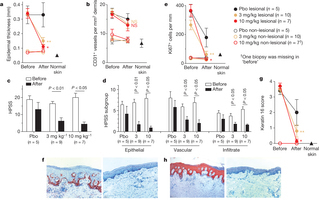Original Article from The New England Journal of Medicine — Efficacy and Safety of Alirocumab in Reducing Lipids and Cardiovascular Events
Abstract NEJM
BACKGROUND
Alirocumab, a monoclonal antibody that inhibits proprotein convertase subtilisin–kexin type 9 (PCSK9), has been shown to reduce low-density lipoprotein (LDL) cholesterol levels in patients who are receiving statin therapy. Larger and longer-term studies are needed to establish safety and efficacy.
Full Text of Background...
METHODS
We conducted a randomized trial involving 2341 patients at high risk for cardiovascular events who had LDL cholesterol levels of 70 mg per deciliter (1.8 mmol per liter) or more and were receiving treatment with statins at the maximum tolerated dose (the highest dose associated with an acceptable side-effect profile), with or without other lipid-lowering therapy. Patients were randomly assigned in a 2:1 ratio to receive alirocumab (150 mg) or placebo as a 1-ml subcutaneous injection every 2 weeks for 78 weeks. The primary efficacy end point was the percentage change in calculated LDL cholesterol level from baseline to week 24.
Full Text of Methods...
RESULTS
At week 24, the difference between the alirocumab and placebo groups in the mean percentage change from baseline in calculated LDL cholesterol level was −62 percentage points (P<0.001); the treatment effect remained consistent over a period of 78 weeks. The alirocumab group, as compared with the placebo group, had higher rates of injection-site reactions (5.9% vs. 4.2%), myalgia (5.4% vs. 2.9%), neurocognitive events (1.2% vs. 0.5%), and ophthalmologic events (2.9% vs. 1.9%). In a post hoc analysis, the rate of major adverse cardiovascular events (death from coronary heart disease, nonfatal myocardial infarction, fatal or nonfatal ischemic stroke, or unstable angina requiring hospitalization) was lower with alirocumab than with placebo (1.7% vs. 3.3%; hazard ratio, 0.52; 95% confidence interval, 0.31 to 0.90; nominal P=0.02).
Full Text of Results...
CONCLUSIONS
Over a period of 78 weeks, alirocumab, when added to statin therapy at the maximum tolerated dose, significantly reduced LDL cholesterol levels. In a post hoc analysis, there was evidence of a reduction in the rate of cardiovascular events with alirocumab. (Funded by Sanofi and Regeneron Pharmaceuticals; ODYSSEY LONG TERM ClinicalTrials.gov number, NCT01507831.)
Via Krishan Maggon



 Your new post is loading...
Your new post is loading...










Jennifer G. Robinson, M.D., M.P.H., Michel Farnier, M.D., Ph.D., Michel Krempf, M.D., Jean Bergeron, M.D., Gérald Luc, M.D., Maurizio Averna, M.D., Erik S. Stroes, M.D., Ph.D., Gisle Langslet, M.D., Frederick J. Raal, M.D., Ph.D., Mahfouz El Shahawy, M.D., Michael J. Koren, M.D., Norman E. Lepor, M.D., Christelle Lorenzato, M.Sc., Robert Pordy, M.D., Umesh Chaudhari, M.D., and John J.P. Kastelein, M.D., Ph.D. for the ODYSSEY LONG TERM Investigators
March 15, 2015DOI: 10.1056/NEJMoa1501031